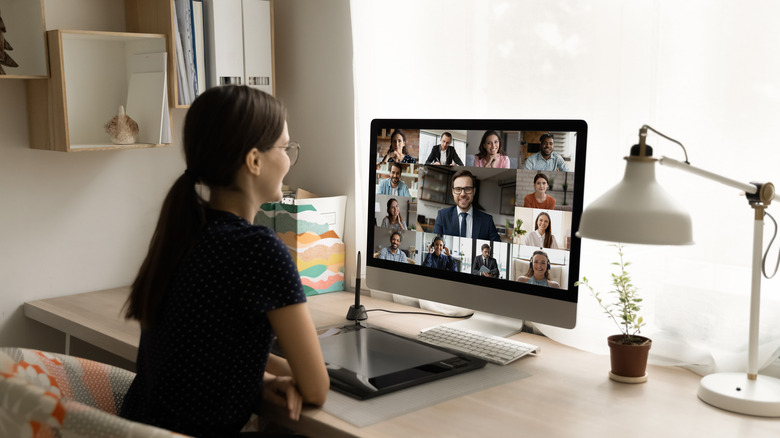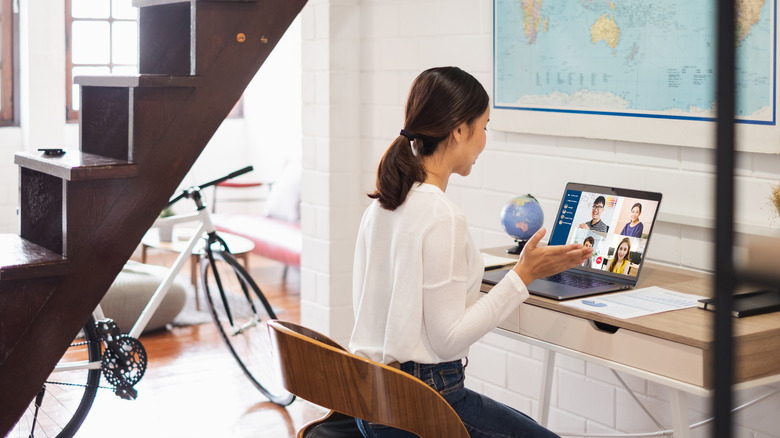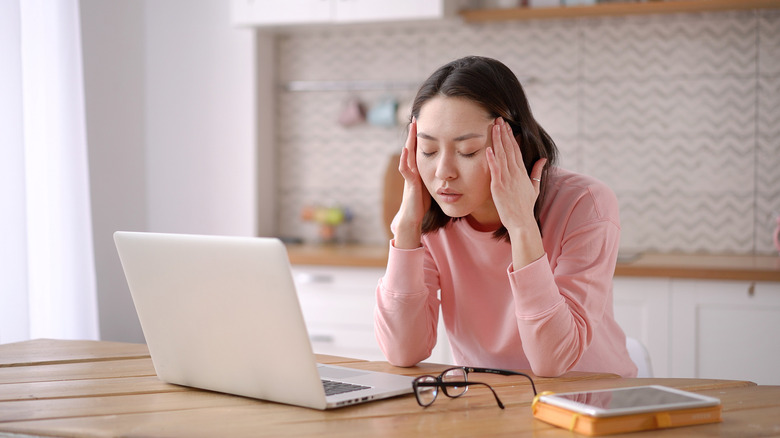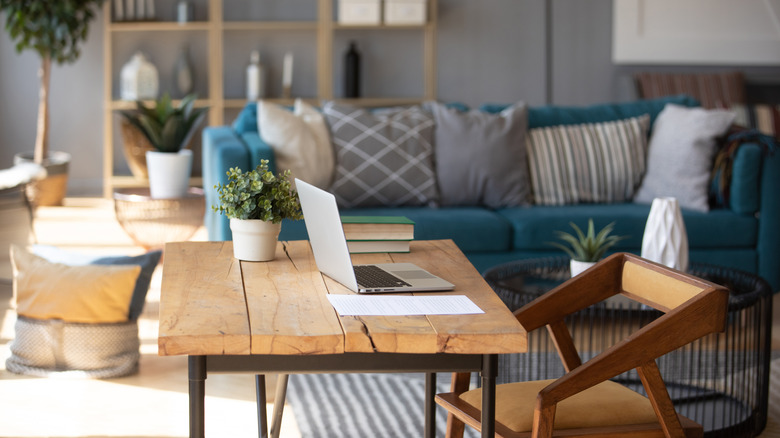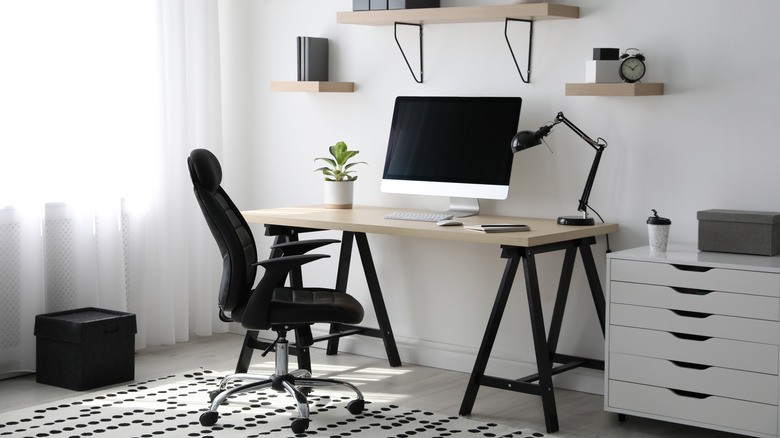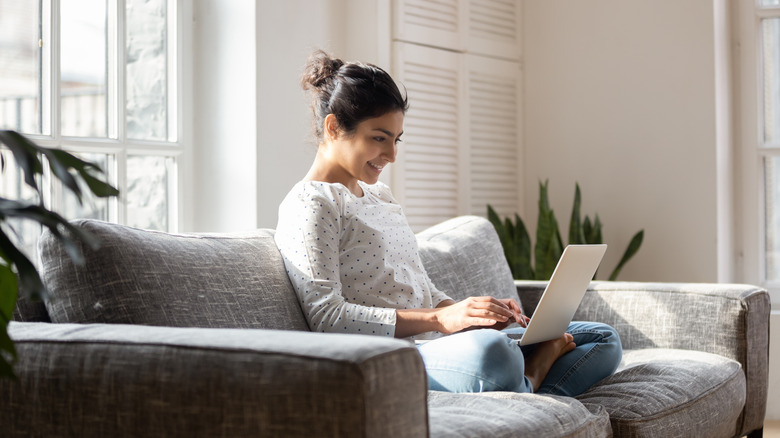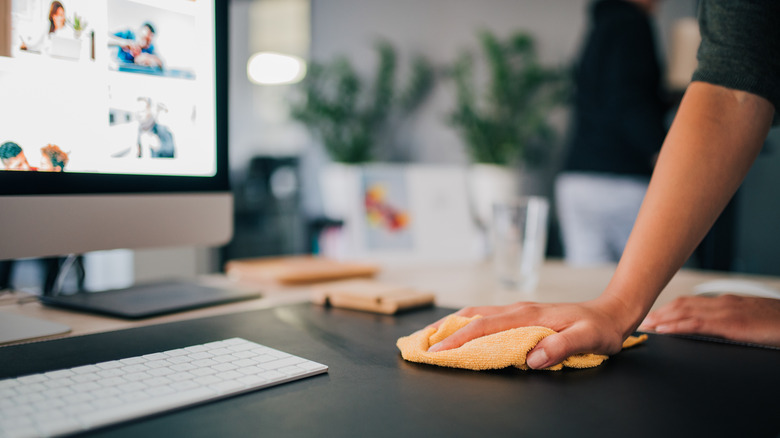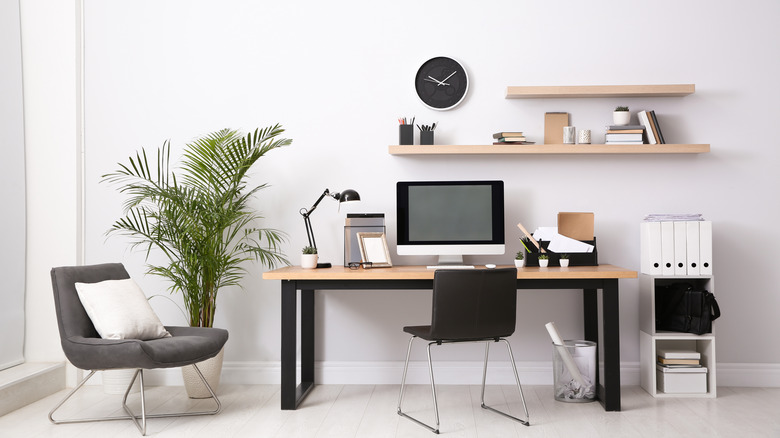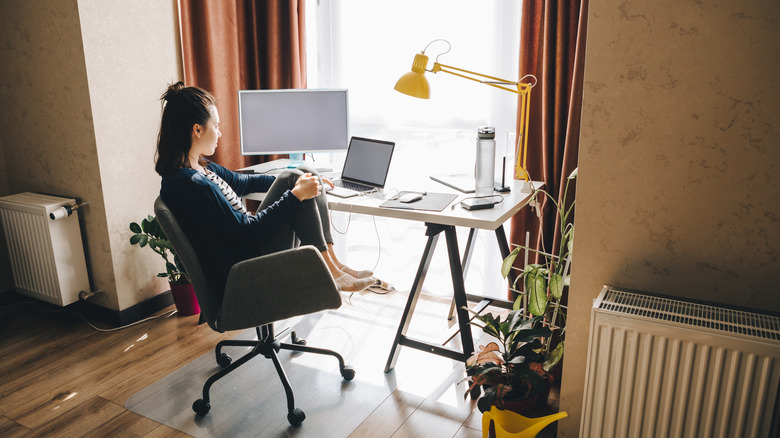What A Designated Office Space Can Do For Your Work-From-Home Mental Health
When it became clear that COVID-19 was going to stick around for way longer than the initial two week lockdown, many companies made it a priority to shift to a work-from-home status. The changed work environment — while certainly an adjustment — came as good news to many, as the idea of working in sweatpants all day and having easy access to the refrigerator felt like a godsend. But those initial two weeks then turned into two months, then six months, then a year — and as of publication, we're at the two year mark, and suffice to say, we're all sick of it. While vaccines have come in record time, variants and frequent surges have made it impossible to predict when the world will return to normal — if it ever will.
With that said, the status of working from home is more or less permanent for so many out there, and the initial enthusiasm that the shift in working environments was met with has significantly decreased. Social lives are at an all time low, loneliness and isolation are rampant, and lines between work and personal lives have blurred. With all that said, a designated office space at home could be the answer you're looking for — here's how it could improve your mental health.
March 2020 effectively changed the way most people worked
When we think back to the early weeks of March 2020, none of us could've predicted what the month would hold. We went from in-office work and after-hours drinks with coworkers to sudden isolation at home. The shift, in retrospect, is a little painful to think about. While those early days were fraught with chaos, it became clear — when big companies and large tech names sent their employees home — that we were in for a siege. As noted by the Society for Human Resource Management during the early weeks of the pandemic, companies such as Google, Microsoft, Apple, and Facebook all sent their employees home, marking a significant shift in the big business world. Many companies would follow suit, and here we are — two years later — in just about the same scenario.
"Here at Microsoft ... we're encouraging our teams to work from home as much as possible, as are many organizations in this region," Jared Spataro, a Microsoft vice president, wrote back on March 5, 2020. "At Microsoft, our top priority is the health and safety of employees, customers, partners and communities."
The early weeks of the pandemic proved that a work-from-home experiment was under way
Before the COVID-19 pandemic drastically changed the professional landscape, working from home was a trend picking up steam. A study from the U.S. Bureau of Labor Statistics showed that in the 2017 to 2018 work year, 29% of employees could work from home, and 25% took advantage of the opportunity. What caused the increase? Cost of living was a huge factor, and technology like Slack, Zoom, and Teams made working from home much easier. However, the mass shift to a work-from-home status due to the pandemic was involuntary for most, and as noted by The Atlantic, it marked the beginning of the work-from-home experiment.
Very few people knew if working from home would be sustainable, and the only people who were really making educated guesses at the beginning of the pandemic were psychologists, economists, and the likes of those who predict the markets. But for the average Joes and Jills among us, none of us really knew what working from home was going to be like — and it's safe to say that many of us didn't think it would last as long as it has.
As of March 2021, it became clear that working from home was the new norm
So has the work-from-home experiment, as aforementioned, been successful? In part, yes, and in part, no. Companies and businesses across the country have been able to sustain their growth, and even thrive in some cases — giving us the "yes" answer. But as noted by CNN, the "no" answer comes in the form of employee happiness, sustainability, and mental health, all of which have taken a hit as a result of working from home.
CNN reported, in an article published at the one year mark of the pandemic, that the boundaries between professional and personal lives have taken a beating as a result of the pandemic and a work-from-home status. Between inadequate at-home work spaces, balancing the needs of family, pets, dependents, and trying to stay motivated and productive at work — something was bound to give, and it turned out to be the well-being of the employee. It didn't help, additionally, that employees were combating the outdated notion that people who work from home get less work done and focus less on their careers than their office-bound counterparts. But if 2021 made anything clear, it's that working from home isn't going away anytime soon.
Working from home has negatively impacted mental health, but there are ways to avoid pitfalls
As we've established — before we dive into what a designated home office space can do for your wellbeing — working from home has not only become the norm, but has had largely negative impacts on the employee. While boundaries have been crossed and family members have made things challenging, perhaps the biggest aspect that has taken a toll for many across the country is mental health. And unfortunately, not a ton of companies have made it a priority to focus on the mental wellbeing of their employees.
A survey conducted by the American Psychiatric Association in 2021 found that just one out of every five employees reported work-provided mental health services, a 15% drop from the year before. Percentages also dropped when it came to openness in the workplace regarding mental health among both colleagues and superiors — dropping from 65% to 56% among colleagues, and 62% to 56% among superiors.
Another study, cited by Forbes, found that many employees working from home reported suffering from isolation, lack of work boundaries, loneliness, and other mental health issues. If you have found yourself in a similar situation, you are not alone, and we have tips and tricks to help make your at-home work environment as healthy and beneficial as possible.
Your at-home office space should be treated like work, with a commute and designated hours
No matter what your at-home office or work set up looks like, there are a couple things you can do outside of your work environment that will establish routines and help improve your mental health. So many of us were used to commuting to work, and while it's nice not to sit in the car anymore, the commute actually gave us time to transition from a home to work mentality, per CNBC. Anna Dearmon Kornick, a time management coach, told CNBC that for those of us working from home, a "start-up routine" in place of a commute could be one of the best ways to improve mental health — your routine could look like making breakfast and a coffee, working out, catching up on the news, meditating, etc. — and it should all be done outside of your work hours and setting.
It is also incredibly important, in addition to setting up an adequate work-from-home space, to have boundaries when it comes to your hours. The Society for Human Resource Management reported that almost 70% of employees who work from home are now working over the weekends, and about 45% are working more hours than they used to in the office.
Trade working from the kitchen table to a desk with an actual office chair
So you've established your morning routine, your "commute," and your hours. Now let's talk about your seating arrangement. This might seem like such a small thing, but working from the kitchen table could actually be doing way more harm than you realize. As per Burkett's Office, a solid, well-designed office chair could do wonders for your at-home working experience, as reports have found that the more comfortable an employee is, the better their work performance. This seems like a rather obvious correlation, but in the throes of the pandemic, it's an aspect of working from home that we may have overlooked.
If you can — and we're all for Craigslist and Facebook Marketplace — try to get yourself an ergonomic office chair that is designed to help support the body's ideal positioning. An ergonomic chair, per Office Interiors, can improve posture, reduce pain and tension in the neck and back, can decrease the pressure placed on the hip joints throughout the day, and can increase blood circulation. All these aspects can significantly adjust both your physical and mental health, taking your at-home office setup from drab to fab in one purchase.
Working from the couch can have significant setbacks, so set up a space that's separate
We hear what you're saying, "No kitchen table, got it. But what about the couch?" We can't stress enough how important it is to separate your home life and your work life, and as it turns out, working from the couch can have significant mental health setbacks. As per Boston.com, you should not be conducting your professional life from anywhere that you relax — so think the couch or your bed. Andrew Snyder, a digital strategist, told Boston.com that he worked remotely before the pandemic, and tried (and failed) to work from his sofa. "Don't work from your couch for 20+ hours a week — I have tried," he said.
With that said, we're aware that some people don't have a separate room — or even space in their living room — to set up a desk. Space is tight, and rent is expensive. So if working from your couch is the only option, there are ways that you can designate the space as an "office" that can work wonders for your mental health. Per Rolling Stone, products like a lap desk, an arm tray for your morning cup of coffee, a lumbar support pillow, and a great floor lamp can improve the space significantly.
A designated office space can help you avoid working and doing household chores
If you're fortunate enough to have an entire room dedicated as an office space, or you have a permanent set up in your living room with a desk and (say it all together) ergonomic office chair, that's step one. Step two, in ensuring that your mental health becomes and stays the priority, is to be very mindful with your time and not balance your work life and home life at the same time. As reported by FlexJobs, the average worker spent about 26 minutes commuting to work — now that this is no longer an aspect of daily life, use that extra time to put away the dishes, vacuum the floor, and clear up used mugs from the day before. Once that time is up, however, stop what you're doing and go to work.
In a testimonial to FlexJobs, a copywriter relayed her own experience, saying that she uses "quick" breaks throughout the day to switch her load of laundry, go for a walk, or put dirty dishes in the sink. But the emphasis, as FlexJobs points out, should be on "quick." By separating your work life and chores, the boundaries between professional and personal will become clearer, benefitting your mental health in the process.
A desk or at-home office will keep all your professional belongings in one place
One of the worst feelings in the world is looking at your kitchen island or coffee table and seeing work material pile up, especially if you're off the clock. Since working from home is now such a frequent and normal aspect of everyday life, an at-home office set up or designated space can help keep your work correspondence, calendar, notes, and planner all in one space, rather than strewn across the house. This may seem like a small thing, but keeping your work material in the same designated place where you work can have a massive impact on your mental health, and it will likely help you compartmentalize your professional and personal life, per CNN.
If you're struggling to keep your workspace organized so that you can keep your materials all in one place, here are some helpful tips. Get a file folder with separate sections — one for current projects, past work, helpful correspondence, and more. A dry-erase wall calendar could be your best friend, especially for the visual people among us, and can keep your dates and meetings in check. A rolling cart could also be a game changer, as could a cord organizer.
For parents, a designated home office can help prioritize your kids' mental health
To say that employees' mental health took a hit amid the pandemic is an understatement, but workers who are also parents had yet another challenge on their plate: the mental wellbeing of their kids. You may not realize it, parents, but establishing an at-home office space can have a huge impact on not only your mental health, but your kids' as well, so we can't encourage you enough to set up that office.
As per Verywell Family, many parents who work from home due to the pandemic have had to endure huge changes — work has shifted, yes, but their kids' schooling status, social lives, sports, and hobbies have also changed. Because of that, so many parents have tried to overcompensate, but they too have been suffering from burnout. An at-home office space could not only bring some peace and order to your life, but could teach your kids that when mom and dad are at "work," it's their time to be productive. The boundary may sound difficult to achieve, but the designation could teach your kids independence, structure, and could make your time after work as a family so much sweeter.
If possible, locate your at-home desk near a window
Let's recap: You've got the desk, the desk organization, the best office chair around, boundaries with your boss and your kids, so what else is there to consider? As it turns out, one of the biggest components of working from home that can have a significant impact on your mental health is light, specifically the kind of lighting you're subjected to for hours on end. If you can, try to set up your at-home office space by a window or a large source of natural light — the results will be greater than you think.
As noted by Stouffville Glass Inc. — because who is better to comment on windows than a glass company? — natural light in your office setting can benefit your mood, physical health, and mental acuity. Cohere Sustainability noted that employees who work while exposed to natural light got 46 minutes more sleep per night, had up to 40% more measurable productivity at work, and benefitted from exposure to the sun's natural vitamin D. So if possible, try to buddy up your at-home office space to the biggest window in your apartment, or better yet, set up a little desk situation outside (weather permitting).
An at-home office can help you curate your ideal working experience
Stop and think about your in-person office for a second — did you work in a cubicle? Was your desk butted up to someone else's? Did you have any semblance of privacy? If you can't answer these questions without cringing just a little, then this is a sign that working from home could have some big benefits. And while there are certainly some mental health pitfalls to avoid (of which we've heavily established), setting up an at-home office space could allow you to curate the work setting you've always wanted.
As noted by Active Minds, your at-home office could be made extra special with the inclusion of plants, candles, and other mindful decorations. Better yet, snag an oil diffuser and drop a calming scent like lavender or eucalyptus in there — it'll feel like you're at the spa (sort of). We Work Remotely also noted that setting up your ideal office environment could allow for some serious freedoms — do you like listening to music while you work? What about a podcast? Now you can listen to whatever you'd like without the hassle of headphones.
Working from an at-home office can foster colleague relationships, even remotely
When we think of the typical office, chances are the images of a water cooler and break room from the 1990s comes to mind — but regardless of setting, in-person working environments of course allowed for interpersonal relationships among coworkers. Now that working from home is the reality for most of us, feelings of isolation and loneliness have set in — but don't fret just yet, because establishing an at-home work space could be a game changer for you, and could seriously help your mental health and work connectivity in the process.
As noted by the Harvard Business Review, a study found that over the course of April 2020 and February 2021, the use of team-wide channels used for remote use went down by about 5%. However, workers engaging in small channels or even one-on-one message boards was up by 87%. Why? People crave connection these days, and that can be accomplished in part with a dedicated work environment (even at home) that allows you to focus and tune into your colleagues and shared goals. What's more is that your mental health, productivity, and sense of workplace belonging can significantly improve.
Make sure you close your home office door, shut down computers, and log off
This one may seem like a no-brainer, but once you've established your at-home office space, made a morning routine, established your hours, and helped your kids out with boundaries, you have to stick to your schedule. As noted by Active Minds, one of the most important elements of working from home when it comes to your mental health is shutting down at the end of the day — no "I can just respond to this one email" or "it's only 20 minutes of comp time." No. Once you're off the clock, be off the clock. Leave your material at your desk and return to it in the morning. It's not going anywhere.
In addition, one of the best things you can do for your at-home mental health is limit your screen time. Keep the screens designated to your office — if you can put your phone down, set timers on social media apps, and limit the amount of media you consume, your mental health will absolutely thank you.
